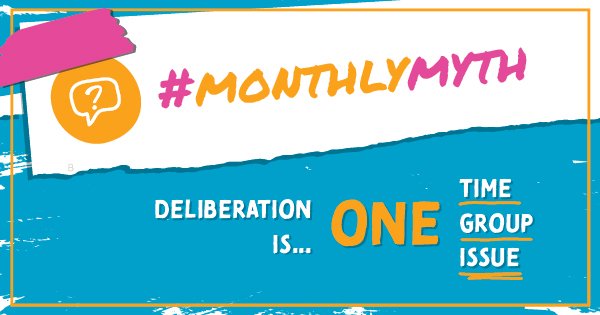Are you strategising secretly? A lot of strategic planning gets done in the dark, which causes plenty of prickly problems. One of the biggest issues with this approach is you get a final plan that doesn’t tackle what’s hard, lacks support and possibly ends up sitting on the shelf. We’re here to help you get your next planning process out into the light. There’s lots of ways to get there, and it doesn’t have to be hard. We’ve got tips to help you develop a plan that has more meaning and impact - something everyone can stand behind.
#MONTHLYMYTH: NO CONSEQUENCES FOR CUTTING ASSET PLAN CORNERS
Victorian councils - don't delay your Asset Plan engagement! Thinking you might rush it through after council elections? If so, it could be time to reconsider. Want to meet Local Government Act requirements, build a plan your decision-makers can stand behind and avoid risks? Then it's almost time to start planning your engagement process. This monthly myth explores the risks of cutting corners, ways to make the most of this golden opportunity, a solution for working around council elections and how to determine the right scale for your deliberative engagement process.
#MONTHLYMYTH: ACCESSIBILITY IS EASIER IN-PERSON THAN ONLINE
Making processes accessible for everyone is something we all strive for in the engagement sector. Most people naturally think that this accessibility is most easily achieved in face-to-face sessions where you can see or hear the interpreters. However, in this blog Q&A, we hear directly from two interpreters and two participants about the many accessibility advantages (and some disadvantages) to online workshops that are worth considering.
#MONTHLYMYTH: DELIBERATION IS A SHORT-TERM INVESTMENT
Deliberative engagement requires time, money and resources and that means you want high returns. Trusted, public decision-making is one (excellent) outcome. However, the benefits can go much further. Here are six ways to generate bigger benefits, longer-term impacts and higher returns on your deliberative engagement investment.
#MONTHLYMYTH: THE BEST ENGAGEMENT CONTRACTOR ALWAYS SAYS 'YES'
You want the best engagement supplier for the job, so it pays to have a critical eye when assessing that pile of proposals. The easy choice that appears to ‘tick every box’ isn’t always the right one. Here’s our guide to picking the best proposal, including red flags to look out for in the procurement process.
#MONTHLYMYTH: TIGHT TIMELINES? RUSH IT THROUGH
#MONTHLYMYTH: DELIBERATION IS ONE TIME, ONE GROUP, ONE ISSUE
We’re seeing plenty of examples of deliberative engagement that involve one randomly selected group working on one issue over a few days together. That approach can be super effective and powerful when done right. There are lots of other exciting possibilities to explore though. Perhaps, an alternative model might be a better fit for your organisation and community or a more effective way to tackle the problem you’re trying to solve.
#MONTHLYMYTH: ENGAGEMENT AND DELIBERATION ARE SIMILAR TO MARKET RESEARCH
We’re sometimes asked if we provide market research services, or if deliberation is a bit like market research. While both areas involve people and information, they involve them in very different ways. The two concepts differ in terms of intent, design and process. This myth post drills down into the key differences between the two, how they might sometimes intersect and why they’re separate, specialised fields.
#MONTHLYMYTH: BELIEFS ARE UNCHANGEABLE
#MONTHLYMYTH: DELIBERATION IS FOR THE COUNCILLORS NOT FOR THE PEOPLE!
We often hear councillors and staff saying they don’t need to involve the community in deliberation as it is the role of councillors, or any elected official, to deliberate on an issue and make decisions. It is important to note that deliberative engagement does not supersede or dismiss the role of councillors in making decisions.
In this #MonthlyMyth, we discuss the five main ways that deliberation can help decision-makers and add value, rather than take away their decision-making powers.














